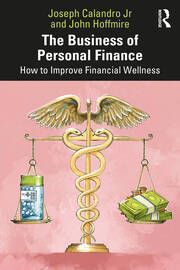This book is no ordinary personal finance book. It presents, in a highly accessible way, how to effectively understand and manage personal finances, avoiding debt and building for the future, and using straightforward tools and techniques developed in conjunction with business economics.
Fun to read, the book leverages core corporate finance principles in a way that helps people become more financially literate in their personal lives. The premise of this book – that personal and corporate finance can and should be learned together to improve financial wellness and know-how – is considered a breakthrough. Using approaches that have been tried, tested, and proven to work with individuals and employees, the authors apply common business activities like “due diligence,” and tools, such as “financial statement analysis,” to personal finance. This connection has not been presented before, either theoretically or practically. And yet it has the power to both transform how individuals successfully manage their own finances, and, at the same time, informs and educates them in the important aspects of the financial direction of the organizations in which they work.
This is a must-have book for those who are looking for a credible reference tool for how to effectively manage their own finances and for organizations seeking to assist their employees in good financial management, at every level, both in work and at home.
Table of Contents
Introduction
Chapter 1 – The “Ten Commandments” of Financial Wellness
Chapter 2 – Spending, Saving and Interest
Chapter 3 – Ownership and Open Book Management
Chapter 4 – Strategy and Prices
Chapter 5 – Risk Management
Chapter 6 – Cyber Risk
Chapter 7 – Financial Statements and Personal Finance
Chapter 8 – Small Business Finance
Chapter 9 – Your Home
Chapter 10 – Be Careful with Debt
Chapter 11 – Physical and Financial Wellness
Chapter 12 – Personal Investing
Chapter 13 – Other Kinds of Investments
Conclusion and Five More Commandments of Financial Wellness
Authors
Joseph Calandro, Jr is Managing Director of a global consulting firm, Fellow of the Gabelli Center for Global Security Analysis at Fordham University, and a contributing editor of Strategy & Leadership.
John Hoffmire is Research Associate, Kellogg College, University of Oxford, and an associate member of the Senior Common Room, Regent’s Park College. He is also Chairman of Oxford Pharmaceuticals; Chairman of Cadence Innova; Founder of the Center on Business and Poverty; and Chairman of the Personal Finance Employee Education Fund.
Reviews
This short guide to personal finance is chock-full of experienced-based economic wisdom. I wish I could have read it sixty years ago at the start of my career. Regardless of your age, read it now. Absorb its lessons. They will show you how to make better financial and life-cycle decisions to achieve personal financial wellness. — Richard Sylla, co-author of A History of Interest Rates 4th Ed., Professor Emeritus of Economics, New York University; chairman of the Museum of American Finance (2010-2020)
Joe Calandro and John Hoffmire have very effectively written about financial literacy in a way that is practical, accessible and academically strong. This is an excellent resource for those who wish to obtain a better grasp of, and improve, their personal finance.. — Susana Frazao Pinheiro, Head, Healthcare and Life Sciences, School of Management, University College London
Financial independence is the cornerstone of personal freedom and this book provides the most succinct guide I’ve seen for wealth creation. I’m giving copies to all my children and grandchildren — those here and those to come! — John J. Sviokla, author of The Self-Made Billionaire Effect: How Extreme Producers Create Massive Value, PwC Principal (retired), and former Associate Professor of Harvard Business School
I really love the book. It is fresh. And the stories about the financial foibles of well-known celebrities are fascinating. — Tom Garman, Distinguished Professor Emeritus, Virginia Tech
“Someone should have written this book a long time ago. It’s clear that the ways individuals, families, and companies budget, keep track of cash, and measure net worth are similar. But until I read this book, I had never seen anyone make this point.” — Jim Goodman, President, Gemini Investors